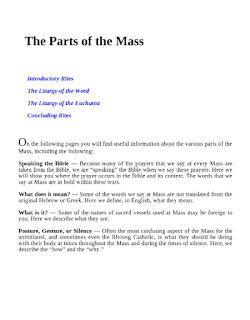From How to Get the Most Out of the Eucharist by Michael Dubruiel
About Michael Dubruiel
From Chapter 3 - Adore. Part 5
LE S S O N S LE A R N ED F RO M A T H REE -Y E A R -O L D
My son Joseph walked into the room while I was putting together the material for this chapter. When he walked in I was having a difficult time coming up with a good illustration for what “living in thanksgiving” means in the concrete and I wasn’t thankful that he was bothering me. Then it struck me that the point of living in thanksgiving is simply that what I might otherwise perceive as an interruption becomes an intervention, once I adore God above all things.
God had sent Joseph into my room. This hit me when I sent him away and he said “Thank you,” as he went off. For a period of his young life he had the habit of saying “thank you,” not after he had been given something that he was appreciative of but rather when he had been told to do something, I think he thought that “thank you”meant “okay.”Yet this is exactly what living in thanksgiving is, saying “thank you” to whatever God presents to us in the daily events of our lives.
“ L I V I N G I N T H A N K S G I V I N G ”
Living in thanksgiving literally means always having gratitude on your lips.
The late great Orthodox liturgist Alexander Schmemann felt that the meaning of “thanksgiving”— the literal translation of the Greek word Eucharist — had been lost on modern people. We tend to limit giving thanks to only those things that we receive that we perceive as good.Yet Schmemann argues that for the early church “giving thanks” was something the Christian did because the Kingdom of God had been restored in Jesus Christ.
Our very inclusion in Christ is reason enough to give thanks; the fact that God has spoken to us in the Word is another reason to give thanks; the fact that Christ has saved us and shares his Body and Blood with us is another reason to give thanks; and the fact that Christ has given us a mission is yet another reason to give him thanks! In fact,you will recognize that at the point in the celebration of the Eucharist that each of these things is mentioned, we express our thanks, either as a congregation, when we say, “Thanks be to God,” or through the presider, when he says to God, “We give you thanks.”
Because of what Christ has done for us we now have a vantage point in life that those who do not know Christ do not have.The liturgy is a mystery of light, and we are on the mountaintop of the Transfiguration and know that Jesus rises from the dead — that he is victorious over our enemies. Therefore, as St. Paul tells the Thessalonians, we can “Give thanks in all circumstances; for this is the will of God in Christ Jesus for you” (1 Thessalonians 5:18).
God had sent Joseph into my room. This hit me when I sent him away and he said “Thank you,” as he went off. For a period of his young life he had the habit of saying “thank you,” not after he had been given something that he was appreciative of but rather when he had been told to do something, I think he thought that “thank you”meant “okay.”Yet this is exactly what living in thanksgiving is, saying “thank you” to whatever God presents to us in the daily events of our lives.
Living in thanksgiving literally means always having gratitude on your lips.
The late great Orthodox liturgist Alexander Schmemann felt that the meaning of “thanksgiving”— the literal translation of the Greek word Eucharist — had been lost on modern people. We tend to limit giving thanks to only those things that we receive that we perceive as good.Yet Schmemann argues that for the early church “giving thanks” was something the Christian did because the Kingdom of God had been restored in Jesus Christ.
Our very inclusion in Christ is reason enough to give thanks; the fact that God has spoken to us in the Word is another reason to give thanks; the fact that Christ has saved us and shares his Body and Blood with us is another reason to give thanks; and the fact that Christ has given us a mission is yet another reason to give him thanks! In fact,you will recognize that at the point in the celebration of the Eucharist that each of these things is mentioned, we express our thanks, either as a congregation, when we say, “Thanks be to God,” or through the presider, when he says to God, “We give you thanks.”
Because of what Christ has done for us we now have a vantage point in life that those who do not know Christ do not have.The liturgy is a mystery of light, and we are on the mountaintop of the Transfiguration and know that Jesus rises from the dead — that he is victorious over our enemies. Therefore, as St. Paul tells the Thessalonians, we can “Give thanks in all circumstances; for this is the will of God in Christ Jesus for you” (1 Thessalonians 5:18).













